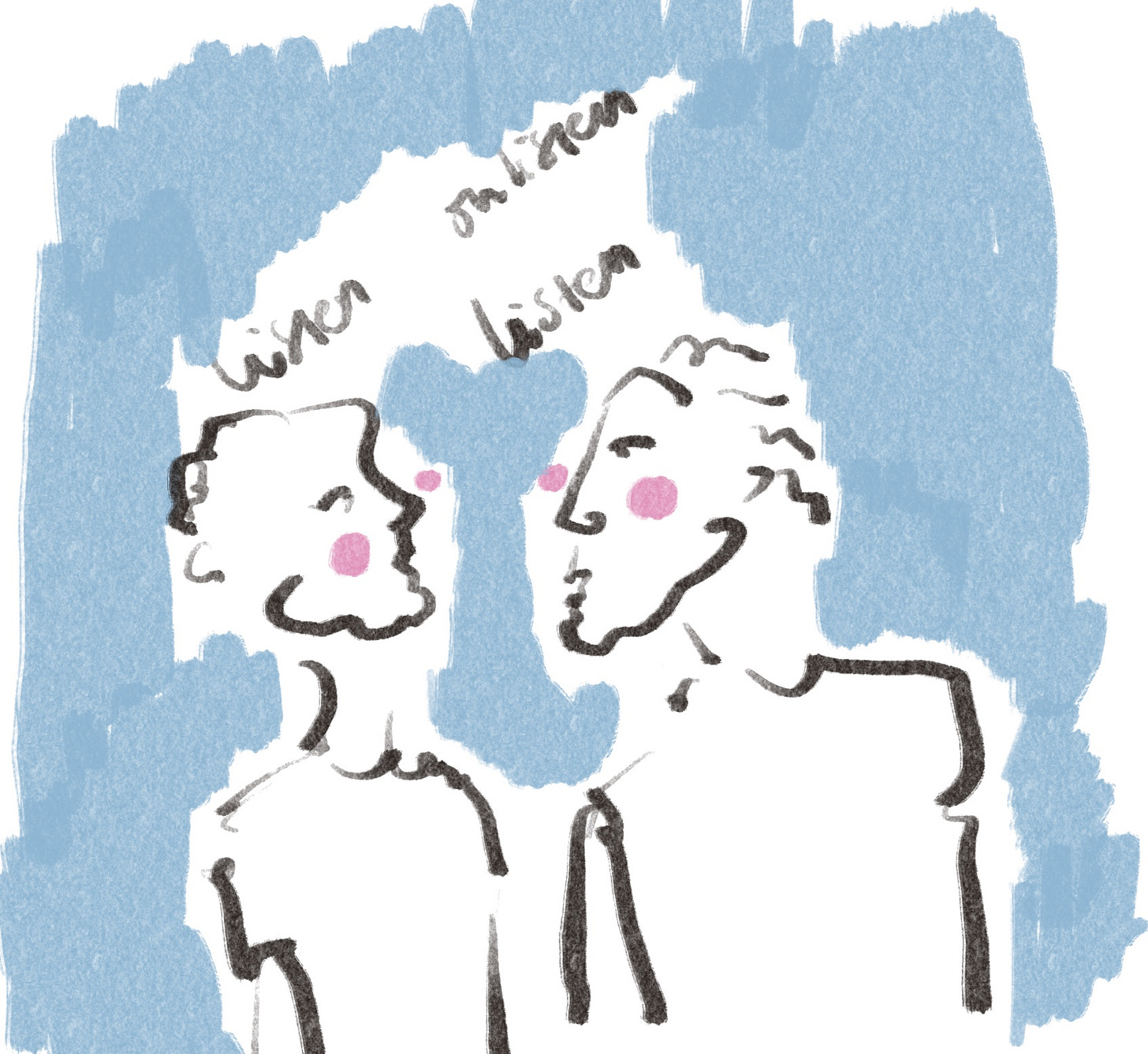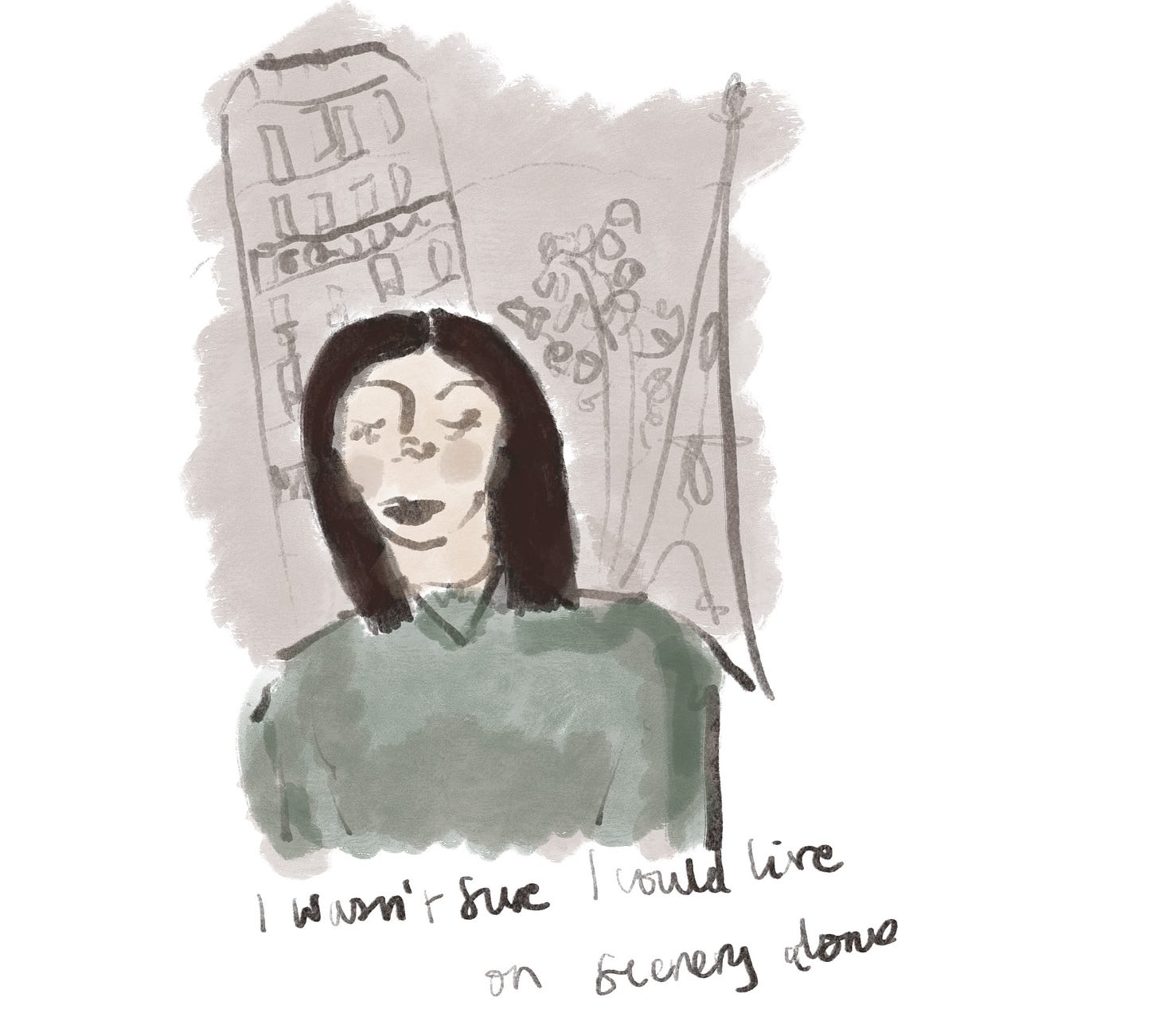Welcome to this very first of a series — ‘Letter from a PFF’ (Pen Friend Friend). Today you are receiving a letter from my wonderful former housemate and forever friend Ellen Quinn Banville, who lived in Paris for seven years before moving back to her native Ireland in 2019. -HM
Hello lovely Pen Friends!
Ellen here, writing to you from a grey and rainy day in Dublin, Ireland. Avid readers might recognise me from previous letters. I am delighted to be here as your Pen Friend of a Friend today.
I was lucky enough to live with Hannah for something like two years in a lovely flat in the 14th arrondissement, until I moved back to Dublin, my hometown, in 2019. During our time on rue P Larousse, Hannah and I made a home together based on mutual care and it’s one of the best living situations I’ve ever been a part of. We also developed the classic flatmate OneBrain, in the sense that my accent took on a distinct London twang in certain lights and Hannah once told me she sometimes thought in an Irish accent.
A true cross-cultural exchange, Hannah taught me the beauty of the Party Tea (crisps for dinner, but make it an event) and more, I taught Hannah about the concepts of road frontage (something I as a Dublin native had to be taught in turn; whether or not your land is accessible by public road, and how it relates to your appeal as a potential romantic match) and the rich expressiveness of Hiberno-English; and one night we actually spent several hours reading to each other from various Wikipedia pages in an attempt to finally get to grips with the timeline of the French Revolution.
Hannah was particularly taken by the idea of Hiberno-English, that is, the set of English language dialects specific to the island of Ireland. The relationship between the Irish people and the English language is well documented; greater scholars than I have explored the origins and evolution, and you’ll find the rhythms and inflections of Hiberno-English in some of the greatest works of literature in the English language.
As with most colonised countries and cultures, it’s impossible to talk about the English language in Ireland without at least some knowledge of our political and social past, and I urge you to seek out those stories and histories – especially if you didn’t grow up in Ireland and might have been taught a completely different version of events, if any version at all. [Incidentally, if you’re interested, there’s a current resurgence of the Irish language (note, we call it “Irish” and not “Gaelic’) happening in Ireland right now, see artists like Kneecap and recent Oscar nominated film An Cailín Ciúin.]
The beauty of Hiberno-English is in the subtext, the unsaid. It has its origins in the Irish language – put simply, we took some of the inflections and cadences of Irish and wedged them in to our new spoken language. Irish is a fascinating language, a language of the ephemeral; nature and folklore and superstition and the seasons mixed with and inextricable from the more practical day-to-day. It’s also a language which (disclaimer) I sadly don’t speak a lick of and so can claim exactly zero authority on. Again, if you’re interested, I urge you to seek out cleverer people than me on the subject. It’ll blow your mind - I learned recently that we have something like seven words for the different phases of the setting sun.
The day-to-day beauty of Hiberno-English is in the chat though. Entire conversations can pass without anyone seeming to actually say anything. I might ask, “how are you”/”how’s it going?” Or, “how was it”, or “how did it go”? And you might reply “stop”, “stop” or an elongated “stooop” and mean any number of things, but not usually actual cessation. The point is that the meaning is in the sigh, the roll of the eyes, the intake or exhaling of a breath. Or you might reply, “oh sure listen”. Listen is a deeply useful and very Irish response to pretty much anything; it’s conspiratorial, it denotes a sense of understanding, of sympathy, of co-feeling. Or sometimes, it means you’re trying to be polite but you actually can’t think of anything to say. Entire conversations can hinge on a properly emphasised listen.
Actually, it's not unlike the French “ça va”, as in – question: “ça va?”(”how are you”), response: “ça va” (fine). Not unlike, ‘you know yourself’, oh sure look sure listen’. Though I spent some time studying French during a short university stint, I really learned the language from eavesdropping, picking up turns of phrase as I went. That is to say, to this day I could not tell you how to conjugate in the conditional tense, I pieced my French together in the “ça va” – “ça va'' of it all.
People often ask if I miss living in Paris. I’ll be gone five years this month (Hannah, can you believe??) and though I do miss it there, and especially our little flat on P Larousse, I am glad to be back in Dublin. I think there’s something in the going and the coming back. Irish people have always been emigrants – call it island mentality – and in the coming back I’ve found a new appreciation for being understood in the most literal sense (you know yourself). I do wonder, might I have kept assimilating until my French reached that level of fluency, the being deeply understood level, and I suppose I’ll never know. I’d love to hear from other non-native Paris residents, or residents of a country other than that of your birth – let’s chat it out in the comments!
Paris is a city which is happening whether you are there or not, she does not necessarily care that you feel welcome or unwelcome. In my more recent visits to Paris, I have felt a strange but not unpleasant other-ness sometimes, which if I felt it as a resident, I have forgotten. I’ve always thought one of the reasons the Parisian look is so pared back is that the city itself is so visually impressive. There’s something thrilling about the anonymity, the architecturally impressive blank canvas of it all. But for me, after a few years, I wasn’t sure I could live on scenery alone. Dublin has many wonderful qualities, beauty not chief among them, but it’s a city made of people, I think.
One of my favourite writers, Haley Nahman, wrote recently about the pleasantness of returning from a vacation which “made [her] fall more in love with [her] life back home.” I suppose I’m trying to take a similar approach to visiting Paris while living in Dublin - being there is like visiting a lovely old self, and coming home is being known again.
—------
Thirty-second book club
Thrilled to be participating in Hannah’s iconic 30 second book club. For the language enthusiasts, I recommend the writing and teaching of Manchán Magan, an Irish linguist, writer and documentary maker. His books, including 32 Words for Field and Focail na mBan (the latter a document of the myriad words for feminine parts but also concepts) are an absolutely fascinating trip into the Irish language and its connection to Irishness more broadly. Thrillingly, he is also now on TikTok.
And a second 30-second, if I may — I’ve just finished “Evenings and Weekends” by London-based Irish author Oisin McKenna. It’s a charming and visceral (as in, very bodily, lots of sweating) debut novel about a group of intertwined people during one especially hot weekend in London. Keen observations of inner lives, I cried on the bus, would recommend!
Thanks so much for having me, dear friends, and Hannah thank you for inviting me and then being patient with me while I took two (TWO) full months to gather some thoughts for you.
À la prochaine,
EQB







“I am delighted to be here as your Pen Friend of a Friend today.”
That made me smile.
“We also developed the classic flatmate OneBrain, in the sense that my accent took on a distinct London twang in certain lights and Hannah once told me she sometimes thought in an Irish accent.”
OneBrain…you named the morphing of two into one, as roommates.
“...the concepts of road frontage (something I as a Dublin native had to be taught in turn; whether or not your land is accessible by public road, and how it relates to your appeal as a potential romantic match)”
OMG…road-frontage being important to Irish match-making?! Who knew?? I need an explanation…in the States, on ladies night in a bar, “road-frontage” would refer crudely to bust size.
“The beauty of Hiberno-English is in the subtext, the unsaid. It has its origins in the Irish language – put simply, we took some of the inflections and cadences of Irish and wedged them in to our new spoken language.”
The term “Hiberno-English” conjures up the phrases that I was introduced to while watching Derry Girls, Frank of Ireland, Bridget and Eamon and old movies like 1935’s, The Informer, the movie with one of my all-time favourite actors, Victor McLaglen (he won the Academy Award for his performance)...note how I spelled “favourite,” as a tip-o-the-hat to Hiberno English.
“ The point is that the meaning is in the sigh, the roll of the eyes, the intake or exhaling of a breath.”
That's true comity.
“Paris is a city which is happening whether you are there or not, she does not necessarily care that you feel welcome or unwelcome.”
I agree, Paris has a unique relationship to the world; similar to the relationship between the earth and the Moon. They exist for us to behold.
“I suppose I’m trying to take a similar approach to visiting Paris while living in Dublin - being there is like visiting a lovely old self, and coming home is being known again.”
I’m feeling much envy; in the States, we’re not tethered to the culture and feeling of being raised in a true culture in a country. We’re packs of mongrels chasing our tails in pursuit of accumulating “things,” not a feeling of belonging. The sad realization this 71 year old has reached is that racism is the true culture of the U.S.A.
BUT YOUR LETTER IS PURE JOY!! So I prefer to reflect on joy. I will investigate the 2 books that you recommend. The sketches are pure joy, as usual.
*Road frontage means that you have a plot of land. Basically means your marriage material. You have a plot of land that. suitable to build a nice house on. Uh, usually because it's beside a road.Feb 16, 2024
Bonjour Ellen. Enchantée.
I truly enjoyed reading this piece and restacked it with a wee intro of my own.
The importance of the language component (often underestimated by expats around the world in my opinion) can only help so much.
Paris is a big city and can be hard to crack for all newcomers including French natives.
I know her well having lived there on and off for over 15 years at different stages of my life.
Interestingly I chose to step away from it when I relocated to my homeland after 23 years stateside and have happily settled down in the Loire Valley since.
In the end, your heart tells you where “home” really is if you listen.
You and I did. A wonderful feeling (most days at least) isn’t it?